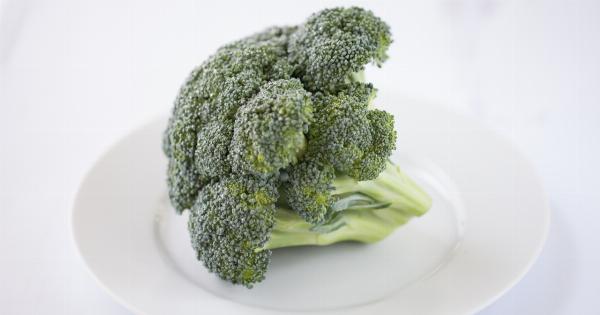Broccoli, a member of the cruciferous vegetable family, is often hailed as a nutritional powerhouse. Packed with essential vitamins, minerals, and antioxidants, broccoli offers numerous health benefits.
Its disease-fighting properties have made it a popular choice among health-conscious individuals. In this article, we delve deeper into the wonders of broccoli and explore how it combats various diseases.
Antioxidants: Nature’s Defense Against Disease
One of the key reasons broccoli is valued for its disease-fighting capabilities is its high concentration of antioxidants. Antioxidants play a crucial role in neutralizing harmful free radicals in the body.
Free radicals are unstable molecules that can cause oxidative stress and damage cells, leading to chronic diseases.
Broccoli contains powerful antioxidants, such as vitamin C, beta-carotene, and various flavonoids. These antioxidants help reduce inflammation, boost the immune system, and protect against oxidative damage.
Cancer Prevention: Broccoli’s Superpower
Broccoli has gained significant attention for its potential role in cancer prevention.
Studies have shown that certain compounds found in broccoli may help reduce the risk of developing various types of cancer, including breast, lung, prostate, and colon cancer.
One such compound is sulforaphane, a sulfur-containing compound that has been extensively researched for its cancer-fighting properties.
Sulforaphane works by activating certain enzymes in the body that detoxify harmful chemicals and inhibit the growth of cancer cells.
Additionally, indole-3-carbinol, another compound found in broccoli, may help regulate estrogen metabolism, reducing the risk of hormone-related cancers such as breast and prostate cancer.
Heart Health: Supporting a Healthy Cardiovascular System
Incorporating broccoli into your diet can also contribute to a healthy heart. Broccoli is rich in fiber, which helps to lower cholesterol levels and improve overall heart health.
Its high concentration of folate, potassium, and antioxidants further support cardiovascular function.
Research suggests that the sulforaphane in broccoli may also have a protective effect against heart disease. Sulforaphane helps reduce inflammation, oxidative stress, and high blood pressure, all of which are risk factors for heart disease.
Eye Health: The Importance of Vision
As we age, maintaining good eye health becomes increasingly important. Broccoli contains several nutrients that promote eye health, including lutein, zeaxanthin, and vitamin C.
These compounds help protect the eyes from harmful oxidative damage and may reduce the risk of age-related macular degeneration and cataracts.
Furthermore, the antioxidants in broccoli may also play a role in preventing damage to the retina and preserving overall vision.
Immune System Support: Strengthening your Body’s Defenses
A robust immune system is essential for overall wellness and disease prevention. Broccoli’s high vitamin C content strengthens the immune system by promoting the production of white blood cells, which help fight off infections and viruses.
Additionally, the antioxidants and phytochemicals found in broccoli work together to support immune function and reduce inflammation. Including broccoli in your diet can help fortify your body’s defenses and enhance overall immune response.
Brain Health: Nourishing the Mind
Incorporating broccoli into your meals can also have positive effects on brain health. The antioxidants and anti-inflammatory properties of broccoli help protect brain cells from damage caused by oxidative stress and inflammation.
Studies have shown that consuming broccoli regularly may improve cognitive function and reduce the risk of neurodegenerative diseases, such as Alzheimer’s and Parkinson’s.
The presence of certain nutrients, such as vitamin K, folate, and choline, further contribute to brain health and cognitive function.
Joint Health: Alleviating Inflammation and Pain
Broccoli’s anti-inflammatory properties extend beyond the brain and contribute to joint health. Chronic inflammation can lead to pain and discomfort in the joints, causing conditions like osteoarthritis.
The sulforaphane and other compounds in broccoli help reduce inflammation and oxidative stress, alleviating joint pain and promoting overall joint health.
Digestive Health: Promoting a Healthy Gut
A healthy gut is essential for overall well-being, and broccoli can contribute to maintaining a balanced digestive system. The fiber content in broccoli promotes regular bowel movements and supports a healthy gut microbiome.
Furthermore, studies have suggested that certain compounds in broccoli, such as glucosinolates and sulforaphane, may help reduce the risk of gastrointestinal disorders, including gastric ulcers and certain types of cancer, such as colorectal cancer.
Including Broccoli in Your Diet
Now that we understand the numerous health benefits of broccoli, it’s important to explore ways to incorporate it into our daily diet. Here are some ideas:.
1. Steamed or Roasted: Steam or roast broccoli lightly to retain its nutrients and vibrant green color. Add a dash of olive oil and seasoning for enhanced flavor.
2. Stir-fries: Include broccoli in your stir-fries along with other colorful vegetables for a nutritious and delicious meal.
3. Salads: Add raw or blanched broccoli florets to your salads for a refreshing crunch and added nutritional value.
4. Soups and Stews: Enhance the nutritional profile of your soups and stews by adding broccoli. Chop it finely or leave it in larger chunks, depending on your preference.
5. Smoothies: For those who prefer a quick and easy way to consume broccoli, blending it into a smoothie with other fruits and vegetables can be a great option.
Remember to choose fresh, organic broccoli whenever possible to maximize its nutritional benefits.
Conclusion
Broccoli, often referred to as a superfood, has rightfully earned its reputation as a vital vegetable for overall wellness.
Its rich nutrient profile, abundant antioxidants, and disease-fighting properties make it a valuable addition to any healthy diet. Whether you aim to prevent chronic diseases, support heart health, boost brain function, or simply maintain a strong immune system, incorporating broccoli into your meals can provide numerous health benefits.
So, embrace the power of broccoli and reap the rewards it offers for your well-being!.






























